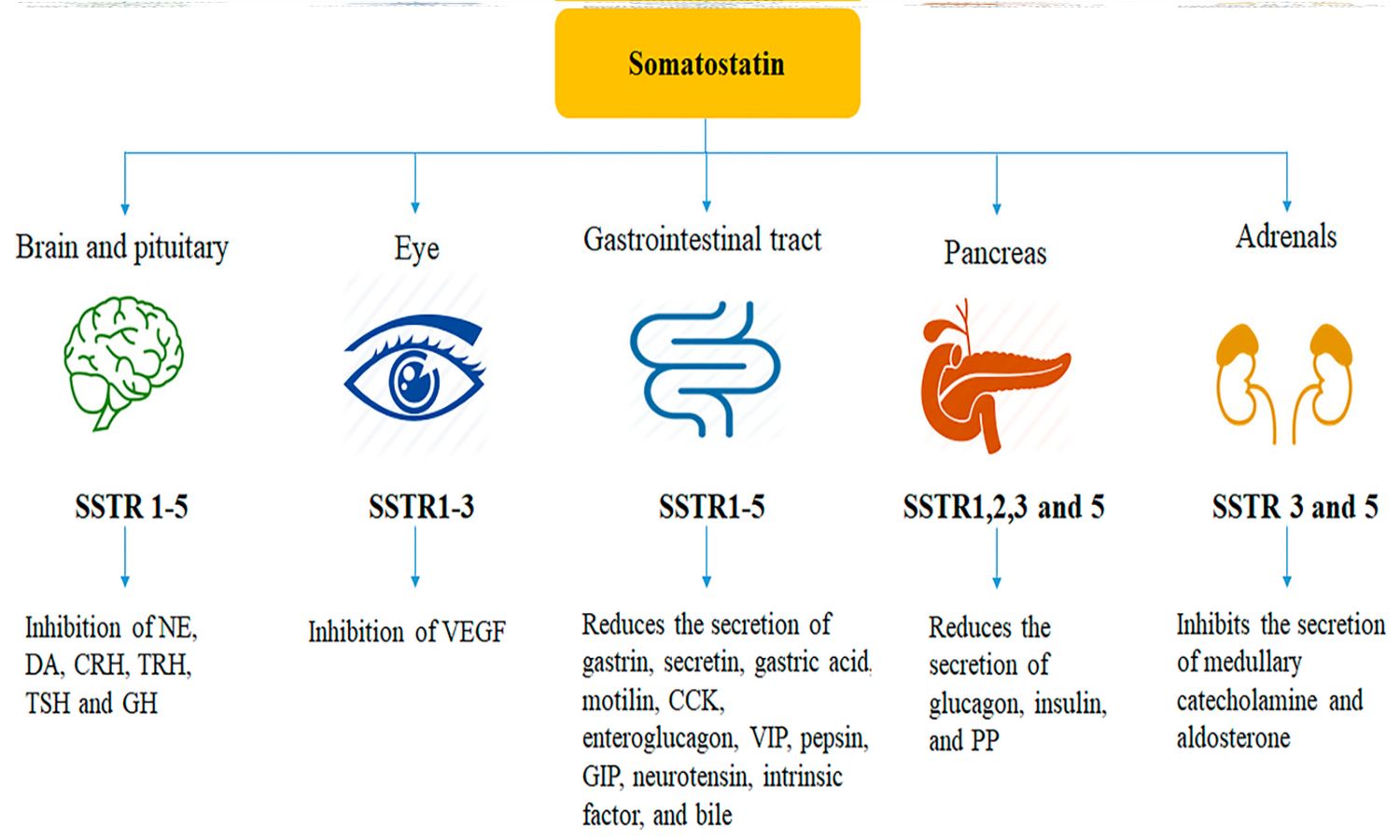
What is somatostatin? Somatostatin, a hormone produced by the hypothalamus, pancreas, and gastrointestinal tract, plays a crucial role in regulating the endocrine system. It inhibits the release of several other hormones, including growth hormone, insulin, and glucagon. This hormone also slows down the digestive process by reducing gastric acid secretion and inhibiting the release of digestive enzymes. Understanding somatostatin's functions can help in managing conditions like diabetes, acromegaly, and certain gastrointestinal disorders. In this article, we'll explore 34 fascinating facts about somatostatin, shedding light on its importance in the human body and its potential therapeutic applications.
What is Somatostatin?
Somatostatin is a hormone that plays a crucial role in the human body. It regulates the endocrine system and affects neurotransmission and cell proliferation. Here are some fascinating facts about this essential hormone.
-
Somatostatin is also known as growth hormone-inhibiting hormone (GHIH).
-
It was first discovered in 1973 by researchers Brazeau, Vale, Burgus, Ling, Butcher, Rivier, and Guillemin.
-
This hormone is produced in several parts of the body, including the hypothalamus, pancreas, and gastrointestinal tract.
-
Somatostatin inhibits the release of growth hormone from the anterior pituitary gland.
-
It also suppresses the secretion of thyroid-stimulating hormone (TSH).
-
In the pancreas, somatostatin inhibits the release of insulin and glucagon.
-
This hormone slows down the digestive process by reducing gastric acid secretion and gastrointestinal motility.
-
Somatostatin has two active forms, one consisting of 14 amino acids and the other of 28 amino acids.
-
The 14-amino acid form is primarily found in the brain, while the 28-amino acid form is more common in the gut.
-
Synthetic analogs of somatostatin, such as octreotide, are used to treat various medical conditions, including acromegaly and certain types of tumors.
Functions of Somatostatin
Somatostatin has a wide range of functions in the human body. It acts as a regulatory hormone, ensuring that various physiological processes remain in balance.
-
It regulates the endocrine system by inhibiting the release of several other hormones.
-
Somatostatin plays a role in neurotransmission by affecting the release of neurotransmitters in the brain.
-
It helps control cell proliferation, which is crucial for preventing the growth of tumors.
-
This hormone also has anti-inflammatory properties, reducing inflammation in the body.
-
Somatostatin can modulate the immune system by affecting the activity of immune cells.
-
It influences the absorption of nutrients in the intestines by slowing down the digestive process.
-
Somatostatin helps maintain blood sugar levels by inhibiting the release of insulin and glucagon.
-
It also affects the secretion of other gastrointestinal hormones, such as gastrin and cholecystokinin.
Medical Uses of Somatostatin
Due to its regulatory functions, somatostatin and its analogs have several medical applications. These treatments can help manage various health conditions.
-
Synthetic somatostatin analogs are used to treat acromegaly, a condition characterized by excessive growth hormone production.
-
These analogs can also be used to manage symptoms of carcinoid syndrome, a condition caused by certain types of tumors.
-
Somatostatin analogs are effective in treating neuroendocrine tumors, which can occur in various parts of the body.
-
They can help control bleeding in patients with gastrointestinal hemorrhages.
-
Somatostatin analogs are used to manage complications of pancreatic surgery, such as fistulas and leaks.
-
These treatments can reduce the symptoms of Zollinger-Ellison syndrome, a condition characterized by excessive gastric acid production.
-
Somatostatin analogs are sometimes used to treat severe diarrhea associated with certain medical conditions.
Interesting Facts About Somatostatin
Beyond its medical uses and functions, somatostatin has some intriguing aspects that highlight its importance in human biology.
-
Somatostatin receptors are found throughout the body, indicating its widespread influence on various physiological processes.
-
There are five known subtypes of somatostatin receptors, each with different functions and tissue distributions.
-
Somatostatin can cross the blood-brain barrier, allowing it to affect brain function directly.
-
This hormone is involved in the regulation of sleep patterns by influencing the release of other neurotransmitters.
-
Somatostatin has been studied for its potential role in treating Alzheimer's disease due to its effects on neurotransmission and inflammation.
-
Research suggests that somatostatin may play a role in regulating appetite and body weight.
-
Somatostatin's inhibitory effects on hormone release make it a potential target for developing new treatments for hormone-related disorders.
-
The hormone's ability to modulate the immune system has led to investigations into its potential use in treating autoimmune diseases.
-
Somatostatin's diverse functions and widespread presence in the body make it a key player in maintaining overall health and homeostasis.
Final Thoughts on Somatostatin
Somatostatin, a hormone with a big role in the body, controls many processes. It regulates the endocrine system, affects neurotransmission, and inhibits the release of other hormones. Found in the pancreas, gastrointestinal tract, and brain, it’s crucial for maintaining balance.
Understanding somatostatin helps in treating conditions like diabetes, acromegaly, and certain tumors. Its synthetic form, octreotide, is used in medical treatments, showcasing its importance in modern medicine.
Research continues to uncover more about this hormone, promising new therapies and insights. Somatostatin’s influence on growth hormone release, insulin regulation, and digestive processes highlights its significance.
By grasping these facts, we appreciate the hormone’s role in health and disease. Somatostatin isn’t just a hormone; it’s a key player in our body’s complex system. Stay curious and keep learning about the wonders of human biology.
Was this page helpful?
Our commitment to delivering trustworthy and engaging content is at the heart of what we do. Each fact on our site is contributed by real users like you, bringing a wealth of diverse insights and information. To ensure the highest standards of accuracy and reliability, our dedicated editors meticulously review each submission. This process guarantees that the facts we share are not only fascinating but also credible. Trust in our commitment to quality and authenticity as you explore and learn with us.
